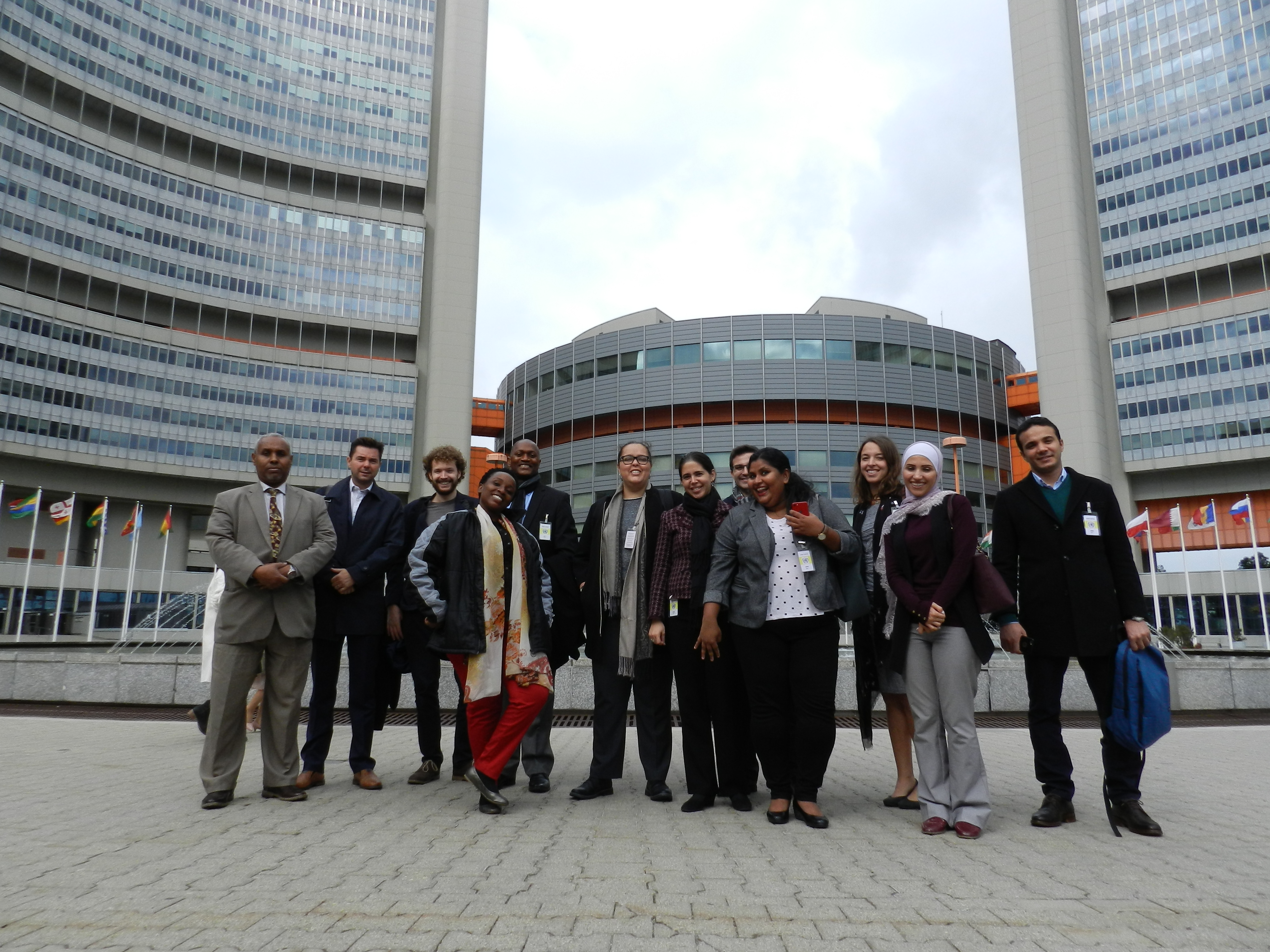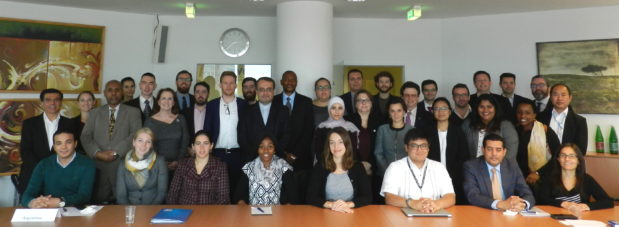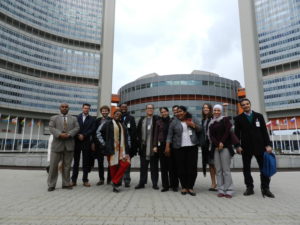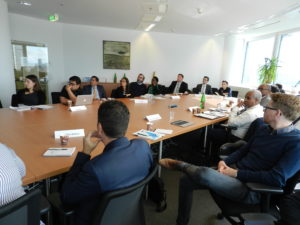
The VCDNP and the James Martin Center for Nonproliferation Studies (CNS) held its sixteenth intensive short course on nuclear non-proliferation and disarmament in Vienna, Austria, from 1 to 5 October 2018. The VCDNP welcomed 27 diplomats and officials from government agencies, permanent missions and international organizations who represented 26 States from Africa, Asia, the Middle East, Europe, South America and other regions. Many of the participants represented their State missions in Vienna, Berlin and Geneva, while others traveled from their national capitals. Women made up 48 percent of the participants and 40 percent of lecturers and guest speakers.

The course is designed to provide an intensive one-week review of the nuclear non-proliferation regime, its history, constituent elements and current status, as well as an introduction to nuclear disarmament and arms control. Lecturers placed emphasis both on theoretical and practical aspects of the nuclear non-proliferation regime providing a comprehensive overview of the complexities and current challenges. Lectures covered a wide range of topics including the Treaty on the Non-Proliferation of Nuclear Weapons (NPT), export control regimes, illicit nuclear trade, the International Atomic Energy Agency (IAEA) safeguards, the Comprehensive Nuclear-Test-Ban Treaty, new tools for verification and international disarmament initiatives. Case studies analyzing Iran and the Joint Comprehensive Plan of Action and the Democratic People's Republic of Korea (DPRK) nuclear and missile programme helped participants understand the current challenges. The agenda also included a discussion on the establishment of nuclear-weapon-free zones (NWFZs), in particular on the prospects of a NWFZ in the Middle East.
 Participants were also given an opportunity to visit the IAEA Safeguards Laboratory and the Comprehensive Nuclear-Test-Ban Treaty Organization’s (CTBTO) International Data Centre and International Monitoring System. The half day field trip enabled participants to interact with experienced professionals working at both organizations and enhanced their understanding of the technical aspects of safeguards verification and nuclear test monitoring.
Participants were also given an opportunity to visit the IAEA Safeguards Laboratory and the Comprehensive Nuclear-Test-Ban Treaty Organization’s (CTBTO) International Data Centre and International Monitoring System. The half day field trip enabled participants to interact with experienced professionals working at both organizations and enhanced their understanding of the technical aspects of safeguards verification and nuclear test monitoring.
A number of experts and senior officials from the Vienna-based international organizations and missions gave presentations during the course, including Wael Al Assad (former Ambassador, League of Arab States in Vienna), Jasmin Craufurd-Hill (Institute for Regional Security), Kelsey Davenport (Arms Control Association), Jina Kim (Korea Institute for Defense Analysis), Valère Mantels (United Nations Office for Disarmament Affairs), Dmitriy Nikonov (IAEA), Julia Peitl (Federal Ministry for Europe, Integration and Foreign Affairs of the Republic of Austria), Tariq Rauf (NPT expert), Therese Renis (IAEA) and Bozorgmehr (Reza) Ziaran (CTBTO). The VCDNP and CNS lecturers included Dr. Ulrich Kühn (VCDNP), Dr. William Potter (CNS), Laura Rockwood (VCDNP), David Schmerler (CNS) and Ian Stewart (VCDNP/King’s College).
View the course agenda here.
Given the recent developments on the Korean Peninsula following the summits in Singapore and Panmunjom, the course included a public panel discussion that assessed the prospects for denuclearization and achieving lasting peace on the Korean Peninsula. The event, hosted by the Permanent Mission of Japan to the International Organizations in Vienna, featured panelists Anton Khlopkov (Center for Energy and Security Studies, Moscow), Kelsey Davenport (Arms Control Association, Washington, D.C.), and Jina Kim (Korea Institute for Defense Analysis, Seoul).
The VCDNP also encouraged participants to share their own professional experiences and to learn from each other. In this regard, the Center engaged former course alumni in a roundtable discussion which proved to be an invaluable source of information on how multilateralism works in practice and served as a great networking opportunity.
 At the end of the course, participants were able to apply their newly gained knowledge in a simulation activity focused on the 2020 NPT Review Conference. Participants were asked to represent States other than their own during the activity. In their assigned roles, they negotiated a draft final document for the 2020 NPT Review Conference and tried to reach consensus. The activity aimed at challenging participants to look at topical issues from a position other than their national position with the goal of understanding different States’ positions better.
At the end of the course, participants were able to apply their newly gained knowledge in a simulation activity focused on the 2020 NPT Review Conference. Participants were asked to represent States other than their own during the activity. In their assigned roles, they negotiated a draft final document for the 2020 NPT Review Conference and tried to reach consensus. The activity aimed at challenging participants to look at topical issues from a position other than their national position with the goal of understanding different States’ positions better.
At the end of the course, participants completed an anonymous evaluation where they could assess different aspects of the short course and provide suggestions for improvement. Overall, participants found the course to be very useful in providing insightful information that they could utilize in their professional careers.
Below are some of the comments provided by participants (quoted as written):
“The selection of topics was very useful to providing a background of the international security architecture with regard to disarmament & nonproliferation and their legal bases.”
“[I appreciate the] variety of subjects covered and the level of highly educated experts who delivered the information in the simplest way possible especially regarding technical subjects.”
“The course proved to be invaluable and I have certainly benefited immensely from the programme to make me accomplish my professional duties more effectively.”
“After sitting through a GC [the IAEA General Conference] in a metaphorical fog it feels that a number of light bulbs were triggered by this course.”
The VCDNP extends its gratitude to the Carnegie Corporation of New York and the John D. and Catherine T. MacArthur Foundation for its generous support that made this course possible.